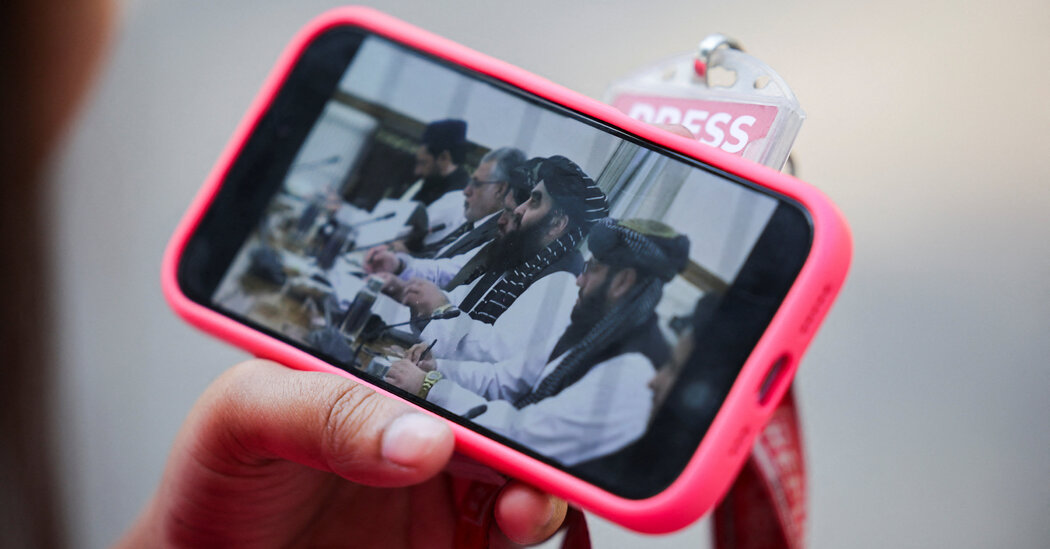India and the Taliban government in Afghanistan announced expanded diplomatic ties on Friday, after they held their most high-powered talks in the four years since Taliban forces overran the America-backed republic in Kabul that New Delhi had supported.
India said it will restore its embassy in Kabul, but while the move elevates diplomatic relations to their highest level after decades of turbulence, it appeared to fall short of a formal recognition of the Taliban government.
But in a sign of escalating geopolitical tensions and political intrigue around the moment, explosions rocked Kabul hours before the meeting between Amir Khan Muttaqi, Taliban’s foreign minister, and his Indian counterpart, S. Jaishankar.
Zabihullah Mujahid, the Taliban’s chief spokesman, confirmed the blasts in the Afghan capital close to midnight, without providing any details, saying it was under investigation.
On social media, there were suggestions, including by former Afghan President Hamid Karzai and a senior former American official, that the explosions were the result of airstrikes by Pakistan’s military targeting militants of the banned group Tehreek-e-Taliban Pakistan, also known as the Pakistani Taliban.
Pakistan’s government has said that the group, which has waged a nearly two-decade insurgency against it, is planning renewed attacks from sanctuaries across the border in Afghanistan with assistance from India’s intelligence service. Afghan officials deny helping or sheltering the group.
Neither Pakistani officials, nor Taliban leaders, commented on the cause of explosions in Kabul. In a statement on Friday, Pakistan’s military said it had conducted “a series of retribution operations,” but it did not say whether the actions included the strikes in Kabul.
In his meeting in New Delhi with Mr. Muttaqi, a survivor of the group’s first rule over Afghanistan in the 1990s, Mr. Jaishankar said India was elevating its mission in Kabul to the level of an embassy. Unlike the 1990s, India had kept its embassy in Kabul open over the past four years, but at a reduced capacity.
Mr. Jaishankar also said India was expanding its development aid to Afghanistan and would increase the number of visas issued to Afghans — which had only resumed recently, and in small numbers. As part of the aid plan, he listed India’s plans to build shelters for refugees forcibly returned to Afghanistan from Pakistan and Iran.
Mr. Muttaqi, in his statement, emphasized the deep ties between India and Afghanistan and said he hoped his visit and the agreement will increase trust and economic engagement between the two countries. He has invited Indian investment in Afghanistan, including in the country’s mining sector.
“We will not allow any group to threaten others from the Afghan soil, or to use Afghan soil against others,” Mr. Muttaqi said.
Escalating tensions in the region, which are testing loyalties and redrawing relationships, hung heavily over the meeting.
The nuclear-armed neighbors India and Pakistan fought a short military conflict earlier this year. Pakistan’s relations with the Taliban, a group it had long nurtured with safe havens during its two-decade insurgency in Afghanistan, have also plummeted in the years the insurgents retook power in Kabul, and there have been violent clashes between the countries.
Pakistan’s government has been under pressure after a spate of deadly attacks in the country, the latest killing more than a dozen soldiers this week.
At a cabinet meeting on Thursday, Prime Minister Shehbaz Sharif of Pakistan repeated the charge that facilitators in Afghanistan were helping militants cross into his country. His defense minister, Khawaja Muhammad Asif, told the parliament later in the day that a delegation would be dispatched to Kabul within days to press Afghan authorities to dismantle militant safe havens it said were used for attacks inside Pakistan.
If Pakistan did strike Kabul, the timing would be likely to send a message to the Taliban leadership that a closer relationship with India would not be tolerated.
India has been warmer toward the Taliban government in recent years. But during the movement’s rule in Afghanistan during the 1990s and its two-decade insurgency against the Afghan government and its American backers, relations were much more wary. That was in part because of two episodes that remain politically sensitive for Indians: India accused the Taliban of sheltering hijackers who seized an Indian plane in 1999 and landed it in southern Afghanistan, and of conducting a terrorist attack against India’s diplomatic mission in Kabul in 2008 that killed dozens, including four Indian officials.
There was no direct acknowledgment of the two episodes in the public statements by the Indian and Afghan foreign ministers.
“During the 20-year struggle against the U.S. occupation, there were many ups and downs,” Mr. Muttaqi said. “But not once did we give a statement against India. Instead, we always sought good relations with India.”
Salman Masood contributed reporting from Islamabad, Pakistan.
Mujib Mashal is the South Asia bureau chief for The Times, helping to lead coverage of India and the diverse region around it, including Bangladesh, Sri Lanka, Nepal and Bhutan.
The post India and Taliban Expand Ties as Explosions Rock Afghan Capital appeared first on New York Times.




